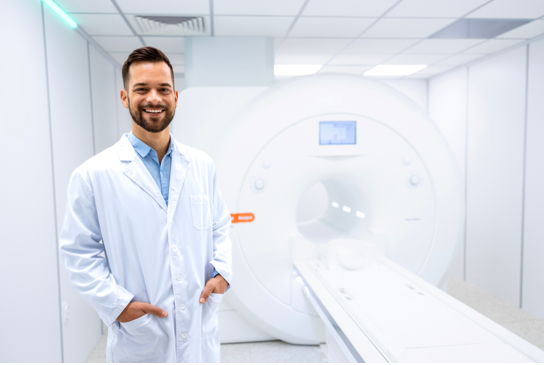In-House vs Outsourced Radiation Safety Officer (RSO) : What’s Right for Your Facility?

Whether you’re opening a new diagnostic imaging center, expanding a dental practice, upgrading equipment in a veterinary clinic, or adding radioisotopes or modalities to your radioactive materials license, radiation safety compliance is non-negotiable. One key question that arises is:
“Do I need to hire a full-time Radiation Safety Officer (RSO), or can I outsource this role to a specialized consultant?”
In this article, we’ll explore the pros and cons of in-house vs. outsourced RSOs, when each option makes the most sense, and how to ensure your radiation protection program meets all regulatory requirements.

What Is a Radiation Safety Officer (RSO)?
A Radiation Safety Officer (RSO) is a key professional in any facility that uses radiation-producing equipment such as X-ray machines, CT scanners, and fluoroscopy units, or uses radioactive materials in medicine or industry. This individual is tasked with developing, implementing and managing the facility’s radiation protection program, which is essential for ensuring compliance with regulatory standards and minimizing unnecessary exposure to ionizing radiation for workers, patients, and the general public. A skilled RSO can effectively maximize the beneficial uses of radiation while minimizing risk.
Responsibilities of an RSO:
- Ensure Compliance: Monitors operational procedures to confirm they align with federal, state, and local radiation safety regulations, which can vary widely depending on jurisdiction.
- Shielding Reviews and Radiation Surveys: Oversees shielding design for new imaging equipment rooms, verifies that the shielding was installed as specified, and confirms that individuals working in the area and those in adjacent rooms are protected.
- Employee Dosimetry and Exposure Tracking: Maintains personnel occupational radiation monitoring programs to track and report radiation exposure to staff, ensuring it remains within regulatory limits and ALARA levels.
- Radiation Safety Training: Provides radiation protection education to workers before they provide radiological services with refresher training regularly thereafter. The RSO develops and delivers these programs to educate personnel on protection practices, emergency protocols, and to ensure radiation exposure to patients and coworkers is as low as reasonable achievable (ALARA).
- Regulatory Inspection Preparation: Manages documentation and inspection-readiness operations to ensure a successful outcome when radiation control or accreditation agencies arrive. The RSO often represents the facility during inspections for all radiation-use areas.
- Recordkeeping: Proper documentation is a cornerstone of compliance. RSOs maintain all of the auditable records required by regulations so that compliance, radiation safety, and quality control and assurance can be easily demonstrated.

In-House versus Contract Radiation Safety Officer
All facilities using ionizing radiation sources need oversight and direction by a radiation safety professional, but not all require a full-time in-house RSO. A major decision point is the size and complexity of the facility and the number and level of radiation sources in use. Here are some points to consider when making this choice:
RSO Options Based on Facility Type:
- Hospitals and Medical Centers: These facilities often have a variety of high-volume imaging services, including CT, interventional radiology, PET/CT, fluoroscopy, mammography, ultrasound, and general radiography. Nuclear medicine services with radiopharmaceuticals are also offered, both diagnostic and therapeutic. Complexity and scale dictates whether full-time RSOs may be needed or if a consultant physicist can provide the required on-site duties along with off-site support using a hybrid model. Small and medium size facilities can normally be well served by consulting RSOs as well as large facilities with increased on-site time. Some larger facilities may prefer the convenience of a full-time on-site RSO.
- Large Hospitals with Research and Academic Programs: Facilities using sealed and unsealed radioactive sources in non-human use research and laboratory settings, where routine RSO services such as RAM package receipt and radioactive waste management may be needed, as well as large volume radiopharmaceutical therapies and human research protocols, may benefit from full time on-site technical staff and an in-house RSO, although some RSO consultants offer coverage options for these larger programs as well.
- Private Radiology Practices: Imaging centers providing outpatient diagnostic imaging services can benefit greatly from consulting RSOs both in technical expertise and cost-effectiveness using regular visits to ensure safety, compliance, and optimum image quality as well as remote consultation when needed.
- Industrial Radiography: Operations involving industrial and analytical devices containing high activity radioactive materials such as moisture/density gauges require strict monitoring due to the potential for high radiation levels, security concerns, and assurance of public safety. An on-site RSO is recommended.
- Manufacturing/Production Facilities: Commercial facilities often use analytical x-ray devices using x-ray diffraction, x-ray fluorescence, irradiation, detection, etc. for various purposes to achieve specific quality goals. Consulting RSOs working together with on-site professional engineers and scientists can form an effective team for high quality assurance and compliance.

- On-Site Availability: With an in-house RSO, the facility usually has immediate access to radiation safety support during equipment upgrades, incidents, or emergency situations.
- Consistency: An internal RSO gains an in-depth understanding of the facility’s specific workflow, equipment, and staff, which supports proactive and customized safety protocols.
- Daily Oversight: High-risk environments benefit from constant supervision to address potential hazards, reinforce compliance, and ensure documentation is updated in real time.
While valuable, in-house RSOs come with a high cost. Salaries, benefits, ongoing certification, and professional development can make this solution impractical for many facilities plus experienced RSO recruitment and retention is often challenging.

Healthcare providers, industrial sites, and multi-site organizations may find that outsourcing the RSO role can provide robust compliance support with best in class proven methodologies without the cost of full-time staffing. This can be accomplished by right-sizing a hybrid model of on-site time customized to program needs together with remote service provision for jobs not requiring physical presence.
Benefits of an Outsourced RSO:
- Access to Certified Experts: Outsourced RSOs are typically Qualified Medical Physicists (QMPs) or board-certified Health Physicists who bring years of technical experience and a deep understanding of federal and state requirements.
- Cost-Effective: Facilities pay only for the services they need, such as annual surveys, shielding design, or audit preparation, without the overhead of a full-time salary and benefits package.
- Up-to-Date Compliance: Outsourced professionals stay informed on evolving regulations including new requirements from agencies like the NRC, DOT, accrediting bodies, and state and local radiation control programs.
- Shielding Design & Verification: Consultants are very experienced in all types of shielding design given the high volume of service requests, and thus can design the most cost-effective x-ray room shielding that meets the latest standards (e.g., NCRP 147), followed by radiation protection surveys to confirm proper installation and performance.
- Regulatory Compliance Audit Support: Providers assist with everything from compiling reports and documentation to directly interfacing with regulators during inspections.

Case in Point: West Physics
West Physics is a prime example of an experienced, nationwide provider of outsourced Radiation Safety Officer (RSO) services. We serve medical imaging centers, dental chains, veterinary clinics, and large medical academic institutions with customizable support options.
The West Physics RSO program includes:
- Remote and On-Site Support: Facilities can receive expert assistance tailored to their schedule and needs.
- Shielding Design and Verification: From initial layout to final testing, West Physics ensures that shielding meets all applicable codes.
- Dosimetry Program Management: We help track employee exposure, ALARA, fetal monitoring, and implement badging systems.
- Regulatory Filing and Inspection Support: West Physics manages all licensing actions, inspection preparedness, and responds to regulator inquiries and issues on behalf of the client.
With our deep regulatory knowledge and proven track record, outsourcing to West Physics provides both peace of mind and budget flexibility.

How to Decide: Should You Hire an In-House RSO or Outsource?
Choosing between an in-house RSO and an outsourced RSO service requires careful consideration of your facility’s size, complexity, compliance needs, and budget. Additionally, the pool of qualified radiation safety professionals is relatively small making recruitment and retention a challenge.
Ask yourself the following questions:
- What types of x-ray equipment and radioactive materials do we use?
If your facility offers numerous modalities involving ionizing radiation that may be considered higher risk such as therapeutic nuclear medicine, PET/CT, linear accelerator treatments, HDR, interventional fluoroscopy, etc. the regulatory and operational burden should be weighed in the decision process. - What is the volume and frequency of radiation-based procedures we perform?
High procedure volumes, patient or product throughput, and subsequent risk of radiological incidents and variances may be a point of consideration. An overall risk analysis study may provide useful information. - Are we equipped to handle regulatory inspections and compliance documentation internally?
If your team lacks the bandwidth or expertise to understand and maintain the vast array of required documentation including auditable records and reports according to specific retention times, outsourcing to an expert may be a better choice. - What is our budget for radiation safety personnel?
Hiring and maintaining a credentialed RSO is a significant long-term investment not offset by a tangible revenue stream. For many client types, outsourcing offers top-tier support at a fraction of the cost. - Do we have multiple locations with similar compliance needs?
Multisite facilities often benefit from centralized, outsourced RSO programs that ensure consistency across all locations.
Carefully and candidly evaluating the above questions often leads to the conclusion that outsourcing your RSO function is likely the smarter, more scalable option. You can access expert-level compliance and guidance without the expense or administrative burden of hiring full-time staff.

Compliance Without Compromise
Radiation safety is a regulatory requirement—but more importantly, it’s a commitment to the safety and well-being of patients, workers, and the community. Whether you’re running a high-volume hospital imaging department or a small dental practice, radiation protection cannot be left to chance.
By evaluating your operations through the lens of risk, cost, and compliance, you can choose the RSO model that aligns with your goals. Hiring a full-time Radiation Safety Officer may be ideal for larger facilities with complex operations, but for many practices, outsourcing to a specialized provider like West Physics delivers best-in-class safety, efficiency, and peace of mind.
To learn more about our RSO services click here.